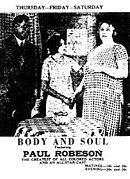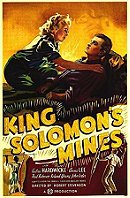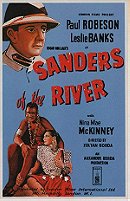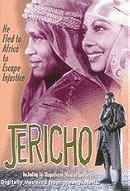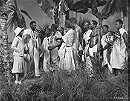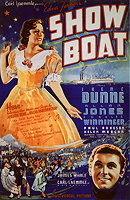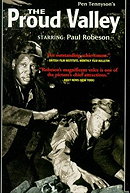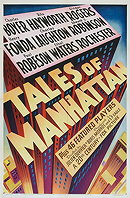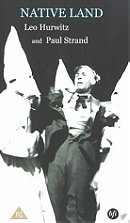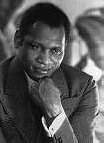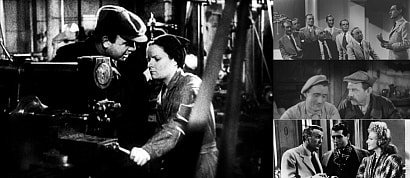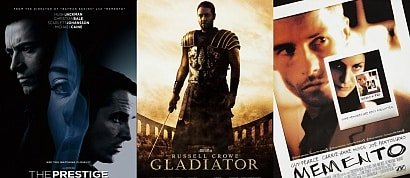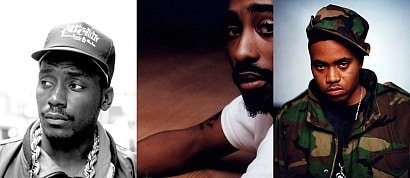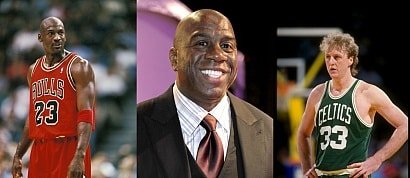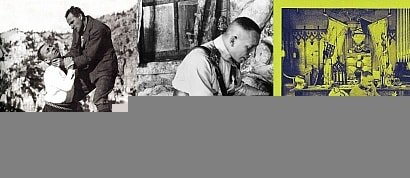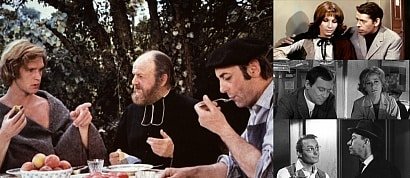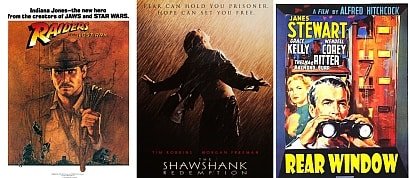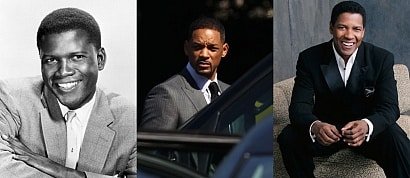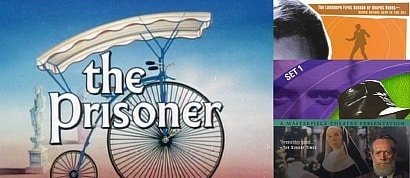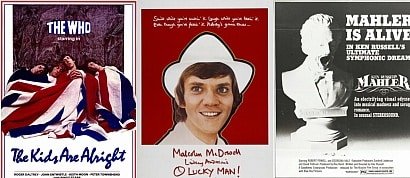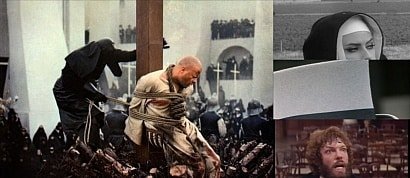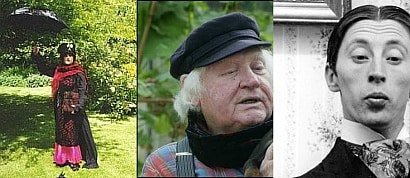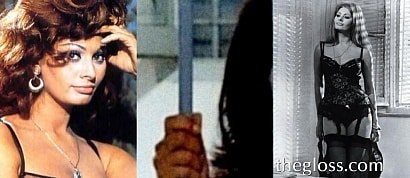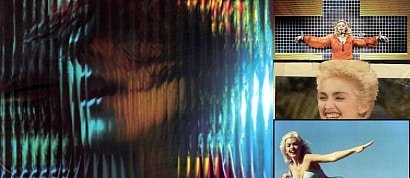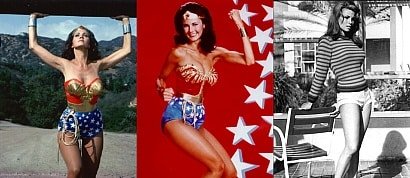The Films of Paul Robeson
Sort by:
Showing 12 items
Decade:
Rating:
List Type:
Body and Soul is a 1925 race film produced, written, directed, and distributed by Oscar Micheaux and starring Paul Robeson in his motion picture debut.
Plot: An escaped prisoner seeks refuge in the predominantly African American town of Tatesville, Georgia, by passing himself off as the Rt. Reverend Isaiah T. Jenkins. He is joined in town by a fellow criminal, and the pair scheme to swindle the phony reverend’s congregation of their offerings. Jenkins falls in love with a young member of his congregation, Isabelle Perkins, even though she is in love with a poor young man named Sylvester, who happens to be Jenkins’ long-estranged twin brother. Jenkins steals money from Martha Jane, Isabelle’s mother and convinces the young woman to take the blame for his crime. She flees to Atlanta and dies just as her mother locates her. Returning to Tatesville, Isabelle’s mother confronts Jenkins in front of the congregation. Jenkins flees and during a twilight struggle he kills a man who tries to bring him to justice. The following morning, Martha Jane awakens and realizes the episode with Jenkins was only a dream. She provides Isabelle (who is not dead) and Sylvester with the funds to start a married life together.
Plot: An escaped prisoner seeks refuge in the predominantly African American town of Tatesville, Georgia, by passing himself off as the Rt. Reverend Isaiah T. Jenkins. He is joined in town by a fellow criminal, and the pair scheme to swindle the phony reverend’s congregation of their offerings. Jenkins falls in love with a young member of his congregation, Isabelle Perkins, even though she is in love with a poor young man named Sylvester, who happens to be Jenkins’ long-estranged twin brother. Jenkins steals money from Martha Jane, Isabelle’s mother and convinces the young woman to take the blame for his crime. She flees to Atlanta and dies just as her mother locates her. Returning to Tatesville, Isabelle’s mother confronts Jenkins in front of the congregation. Jenkins flees and during a twilight struggle he kills a man who tries to bring him to justice. The following morning, Martha Jane awakens and realizes the episode with Jenkins was only a dream. She provides Isabelle (who is not dead) and Sylvester with the funds to start a married life together.
SuperAmanda's rating:


Sanders of the River (1935)
Paul Robeson accepted the role of Bosambo during a time when he was living in London and was engaged in deep explorations of the roots of African culture through studies of language and music. He felt that if he could portray the African leader, Bosambo, with cultural accuracy and dignity, he could help audiences—especially Black audiences—to understand and respect the roots of Black culture. The filmmakers even took an unusual step towards authenticity by sending a film crew on a four-month voyage into remote areas of Africa to record traditional African dances and ceremonies. These would be interwoven with the studio scenes.
After the filming, Robeson was asked back to the studio for retakes of some scenes. He discovered that the film’s message had been changed during editing; it seemed to justify imperialism and upholding the 'White Man's Burden'; the finished film is dedicated to "the handful of white men whose everyday work is an unsung saga of courage and efficiency".[1] Bosambo was changed from an African leader to a servile lackey of British colonial rule. Robeson was furious and complained:
"The imperialist plot had been placed in the plot during the last days five days of shooting...I was roped into the picture because I wanted to portray the culture of the African people and I committed a faux pas which convinced me that I had failed to weigh the problems of 150,000,000 native Africans...I hate the picture." In 1938, Robeson also added disparagingly; "It is the only film of mine that can be shown in Italy or Germany, for it shows the negro as Fascist states desire him - savage and childish."
Paul Robeson was so disillusioned by the picture that he attempted, but failed, to buy back all the prints to prevent it from being ever shown.
After the filming, Robeson was asked back to the studio for retakes of some scenes. He discovered that the film’s message had been changed during editing; it seemed to justify imperialism and upholding the 'White Man's Burden'; the finished film is dedicated to "the handful of white men whose everyday work is an unsung saga of courage and efficiency".[1] Bosambo was changed from an African leader to a servile lackey of British colonial rule. Robeson was furious and complained:
"The imperialist plot had been placed in the plot during the last days five days of shooting...I was roped into the picture because I wanted to portray the culture of the African people and I committed a faux pas which convinced me that I had failed to weigh the problems of 150,000,000 native Africans...I hate the picture." In 1938, Robeson also added disparagingly; "It is the only film of mine that can be shown in Italy or Germany, for it shows the negro as Fascist states desire him - savage and childish."
Paul Robeson was so disillusioned by the picture that he attempted, but failed, to buy back all the prints to prevent it from being ever shown.
SuperAmanda's rating:


Dark Sands (1937)
Jericho (also known as Dark Sands) is a 1937 film directed by Thornton Freeland and starring Paul Robeson.
Paul Robeson considered Jericho one of his most positive accomplishments in projecting a screen image of a Black man with courage, honor, self-sacrifice and intelligence who achieves success and happiness. The epic film begins as a World War I American troop ship is torpedoed, and many soldiers are trapped below the deck. Robeson plays Jericho Jackson, a medical student drafted into the war. Jericho heroically saves the trapped men, in defiance of his superior’s orders to abandon ship, but he accidentally kills the officer in the melee. Despite his heroism, Jericho is court-martialed for refusing an order. Embittered, he escapes, and an officer named Captain Mack is held responsible for his escape and court-martialed.
Jericho ends up in North Africa, where he meets the Tuareg people. When he uses his medical skills to heal the sick, the Tuareg welcome Jericho into their tribe, and he marries and raises a family with them, eventually becoming their leader. He leads his people to victory over rivals and brings peace and unity to the region through which the Tuareg trek annually to trade for salt. When an anthropology film crew’s coverage of the salt trek is shown in London, Captain Mack spots Jericho in the film and vows to track him down. Finally, when the Captain sees what good works Jericho has done for his people, he relents.
It is telling of Robeson’s demand for final cut that at this point in the story, Jericho, homesick, was to agree to help clear the captain’s name in the United States. After their plane crashes in the desert, Jericho dies trying to save Captain Mack. Instead, Robeson simply requested that the movie end with the captain flying off alone and crashing in the desert.
Paul Robeson considered Jericho one of his most positive accomplishments in projecting a screen image of a Black man with courage, honor, self-sacrifice and intelligence who achieves success and happiness. The epic film begins as a World War I American troop ship is torpedoed, and many soldiers are trapped below the deck. Robeson plays Jericho Jackson, a medical student drafted into the war. Jericho heroically saves the trapped men, in defiance of his superior’s orders to abandon ship, but he accidentally kills the officer in the melee. Despite his heroism, Jericho is court-martialed for refusing an order. Embittered, he escapes, and an officer named Captain Mack is held responsible for his escape and court-martialed.
Jericho ends up in North Africa, where he meets the Tuareg people. When he uses his medical skills to heal the sick, the Tuareg welcome Jericho into their tribe, and he marries and raises a family with them, eventually becoming their leader. He leads his people to victory over rivals and brings peace and unity to the region through which the Tuareg trek annually to trade for salt. When an anthropology film crew’s coverage of the salt trek is shown in London, Captain Mack spots Jericho in the film and vows to track him down. Finally, when the Captain sees what good works Jericho has done for his people, he relents.
It is telling of Robeson’s demand for final cut that at this point in the story, Jericho, homesick, was to agree to help clear the captain’s name in the United States. After their plane crashes in the desert, Jericho dies trying to save Captain Mack. Instead, Robeson simply requested that the movie end with the captain flying off alone and crashing in the desert.
SuperAmanda's rating:


Song of Freedom (1937)
One of two elements pivotal to the plot is an opera composer named ''Gabriel Donizetti'', presumably suggested by the historical opera composer Gaetano Donizetti. The other is a medallion that serves to identify Robeson's character as a descendant of an African monarch.
''Song of Freedom'' may best represent the opportunity Robeson was looking for to "give a true picture of many aspects of the life of the coloured man in the West. Hitherto on the screen, he has been characterized or presented only as a comedy character. This film shows him as a real man." Robeson was also given final cut approval on the film, an unprecedented option at the time for an actor of any race.
As in ''Sanders of the River'', the film called for documentary scenes of West African traditional dances and ceremonies, but this time Robeson obtained a contract giving him final cut, so that the film’s message would not be changed behind the doors of the editing room.
Robeson plays Zinga, a black dockworker in England with a great baritone singing voice. He is discovered by an opera impresario, and is catapulted into great fame as an international opera star. Yet he feels alienated from his African past, and out of place in England. By chance, he is informed that an ancestral medallion that he wears is proof of his lineage to African kings, and he leaves fame and fortune to take his rightful place of royalty. Reunited with his people, he plans to improve their lives by combining the best of western technology with the best of traditional African ways.
Although the film was not a box office success in the US, it was notably chosen in 1950 to open the convention of Ghana’s People’s Party. The ceremonies were presided over by the future first prime minister of independent Ghana, Kwame Nkrumah, Robeson’s friend from his London years.
''Song of Freedom'' may best represent the opportunity Robeson was looking for to "give a true picture of many aspects of the life of the coloured man in the West. Hitherto on the screen, he has been characterized or presented only as a comedy character. This film shows him as a real man." Robeson was also given final cut approval on the film, an unprecedented option at the time for an actor of any race.
As in ''Sanders of the River'', the film called for documentary scenes of West African traditional dances and ceremonies, but this time Robeson obtained a contract giving him final cut, so that the film’s message would not be changed behind the doors of the editing room.
Robeson plays Zinga, a black dockworker in England with a great baritone singing voice. He is discovered by an opera impresario, and is catapulted into great fame as an international opera star. Yet he feels alienated from his African past, and out of place in England. By chance, he is informed that an ancestral medallion that he wears is proof of his lineage to African kings, and he leaves fame and fortune to take his rightful place of royalty. Reunited with his people, he plans to improve their lives by combining the best of western technology with the best of traditional African ways.
Although the film was not a box office success in the US, it was notably chosen in 1950 to open the convention of Ghana’s People’s Party. The ceremonies were presided over by the future first prime minister of independent Ghana, Kwame Nkrumah, Robeson’s friend from his London years.
SuperAmanda's rating:


The 1936 version of Show Boat is considered by many film critics to be one of the classic film musicals of all time, and one of the best stage-to-film adaptations ever made. Ten numbers from the stage score are actually sung, with four others heard only as background music, and a tiny, almost unrecognizable fragment of the song "I Might Fall Back on You" is heard instrumentally at the beginning of the New Year's Eve sequence. Except for the final ten minutes of the film and the three additional songs written for the movie by Kern and Hammerstein, this production follows the stage musical extremely closely, unlike the 1929 film and the 1951 version released by MGM. It also retains much of the comedy in the show. In 1996, this version of Show Boat was selected for preservation in the United States National Film Registry by the Library of Congress as being "culturally, historically, or aesthetically significant".
The 1936 Universal Pictures film Show Boat was a box office hit for Robeson, and the most frequently shown and highly acclaimed of all his films, and his performance of the main song Ol' Man River was particularly notabl
The 1936 Universal Pictures film Show Boat was a box office hit for Robeson, and the most frequently shown and highly acclaimed of all his films, and his performance of the main song Ol' Man River was particularly notabl
SuperAmanda's rating:


The Proud Valley is a 1940 Ealing Studios film starring the African-American actor Paul Robeson. Filmed on location in the South Wales coalfield the heart of the main coal mining region of Wales, the film tells the story of a Black American miner and singer who gets a job in a mine and joins a male voice choir. It docu-dramatizes the hard realities of Welsh coal miners’ lives. David Goliath, a Black American, arrives in Wales and wins the respect of the very musically oriented Welsh people through his singing. He shares the hardships of their lives, and becomes a working class hero as he helps to better their working conditions and ultimately, during a mining accident, sacrifices his life to save fellow miners.
SuperAmanda's rating:


The story starring Paul Robeson, which featured what were considered black stereotypes even in 1942, came under severe criticism from both Edward G. Robinson, and especially, Robeson, a champion of good film roles for blacks. After a career of only 12 movies and refusing lucrative film offers for over three years, Tales of Manhattan was Robeson’s final attempt to work within Hollywood, yet Robeson was deeply disappointed with the film. He initially thought the depiction of the plight of the rural black poor - shown in the film as investing the bulk of their windfall in communal land and tools - would demonstrate a share-and-share-alike way of life. Although he attempted to change some of the film’s content during production, in the end he found it "very offensive to my people. It makes the Negro childlike and innocent and is in the old plantation hallelujah shouter tradition ... the same old story, the negro singing his way to glory".[3]
Some reviewers and black entertainers (including Clarence Muse), noted that the film exposed blacks’ living conditions under the sharecropping system, but Robeson was so dissatisfied that he attempted to buy up all the prints and take the film out of distribution. Following its release, he held a press conference, announcing that he would no longer act in Hollywood films because of the demeaning roles available to black actors. Robeson also said he'd gladly picket the film along with others who had found the film offensive
Some reviewers and black entertainers (including Clarence Muse), noted that the film exposed blacks’ living conditions under the sharecropping system, but Robeson was so dissatisfied that he attempted to buy up all the prints and take the film out of distribution. Following its release, he held a press conference, announcing that he would no longer act in Hollywood films because of the demeaning roles available to black actors. Robeson also said he'd gladly picket the film along with others who had found the film offensive
SuperAmanda's rating:


Native Land is a 1942 film directed by Leo Hurwitz and Paul Strand.
A combination of a documentary format and staged reenactments. the film depicted the struggle of trade unions against union busting corporations, their spies and contractors. It was based on the 1938 report of the La Follette Committee's investigation of the repression of labor organizing. Paul Robeson participated as an off-screen narrator and vocalist.
A combination of a documentary format and staged reenactments. the film depicted the struggle of trade unions against union busting corporations, their spies and contractors. It was based on the 1938 report of the La Follette Committee's investigation of the repression of labor organizing. Paul Robeson participated as an off-screen narrator and vocalist.
SuperAmanda's rating:


Paul Robeson: Here I Stand is a 1999 documentary video directed by St. Clair Bourne for PBS American Masters series, about the life of singer, actor and activist, Paul Robeson. It features rare extensive archival footage and many unseen still photographs. There are also interviews with Robeson's two main biographers, Lloyd L. Brown and Martin Duberman. As of 2009, the film is the longest and most in depth documentary available about Paul Robeson's life.
SuperAmanda's rating:


Paul Robeson: Tribute to an Artist is a 1979 short documentary film directed by Saul J. Turell. It won an Academy Award in 1980 for Documentary Short Subject. Sidney Poitier provides the narration.
SuperAmanda's rating:


Films and synopsis of the legendary African American acting, singing and international social justice activist.
Added to
Related lists
20 From 70. My Favorite Films From The Year 1970
20 item list by The Mighty Celestial
13 votes 2 comments
2 comments
20 item list by The Mighty Celestial
13 votes
 2 comments
2 comments
35 From 00: My Favorite Films From The Year 2000
35 item list by The Mighty Celestial
6 votes 1 comment
1 comment
35 item list by The Mighty Celestial
6 votes
 1 comment
1 comment
View more top voted lists
People who voted for this also voted for
The filmography of Jacques Becker
Parth's personal favourites
My Favourite Rappers
My top 10 ballers
After Watching These Spectacular Shark .....
Adorable Raccoons You May Just Want As A Pet
The filmography of Erich von Stroheim
Marcel Carné's Filmography
100 Best Movies I've Never Seen (FlickChart)
Nick Park's Filmography
Black Movie Stars
Reasons The Animal Kingdom Is More Ridiculous ....
Of The Rarest Animals In The World
Come in No.6, your time is up!
Needs a Big Break
Super Amanda's Must See Films
Actually THIS book is their best work
Ken Russell's Feature Films
The Ken Russell Repertory Company
Sophia Loren's Hottest Film Roles
MADONNA: THE QUEEN OF PLAGIARISM
The Most Unrivaled Female Bodies in Film History
 Login
Login
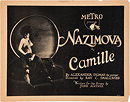
 39
39
 7.3
7.3
 6.5
6.5
